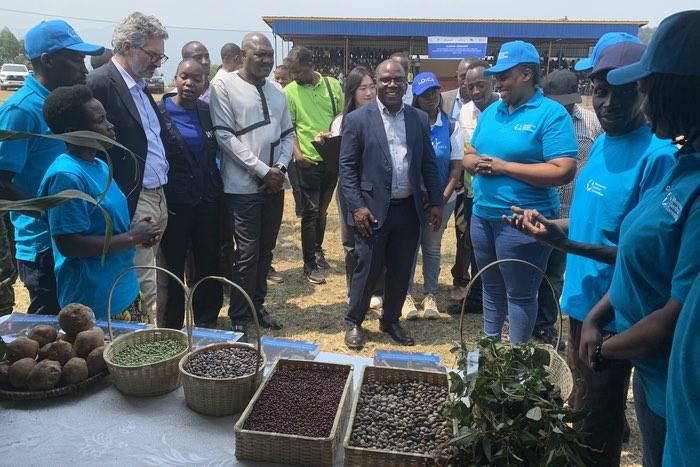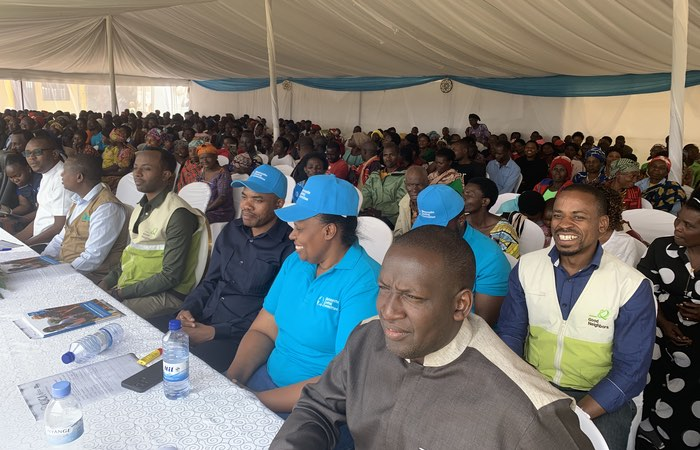
The World Food Programme (WFP) in Rwanda is delighted to announce the closing ceremony of the Sustainable Market Alliance and Asset Creation for Resilient Communities and Gender Transformation (SMART) project. This landmark took place on 26 July 2024 in Rutsiro District, culminating in a transformative journey towards sustainable development and community resilience.
Since the 1970s, WFP has been active in Rwanda, assisting refugees and vulnerable Rwandans in achieving food and nutrition security and building resilience to natural shocks. With extensive experience in resilience-building, WFP has supported the Rwandan Government and local communities through its food assistance for assets programmes. One such initiative is the Saemaul Undong Zero Hunger Communities (SZHC) project, an integrated rural development effort funded by the Republic of Korea, implemented in Rutsiro, Karongi, and Nyamagabe from 2012 to 2018. Following the closure of the SZHC project, WFP launched the SMART project, which was implemented in Karongi, Rutsiro, Nyamagabe, Nyaruguru, and Kayonza districts from July 2020 to June 2024.

The SMART project has been generously funded by the Government of the Republic of Korea through the Korea International Cooperation Agency (KOICA) with a budget of USD 8 million. Since its inception in July 2020, the SMART project has been implemented by WFP in collaboration with six esteemed NGO partners: Good Neighbors International (GNI), DUHAMIC ADRI, Rwanda Development Organization (RDO), Rwanda Rural Rehabilitation Initiative (RWARRI), CordAid, and the Mennonite Central Committee (MCC).
The project aimed to:
1. Improve food security and shock resilience of small-scale farmers;
2. Enable smallholder farmers to increase productivity and marketable surplus; and
3. Strengthen the capacity of government and communities to design and implement nutrition-, gender-, and climate-sensitive social protection programmes.
Over the past four years, the SMART project has made significant strides in enhancing smallholder farmers’ access to essential resources. Key achievements include the rehabilitation of 1,100 hectares of degraded land through WFP’s food assistance for assets programme between 2021 and 2022. The project achieved significant milestones, including the restoration and valorization of 124 hectares of Bitenga marshland in Rutsiro and Agatobwe marshland in Nyaruguru, terracing 976 hectares of land, and establishing a solar-powered hillside irrigation system in Kayonza district.
Additionally, post-harvest infrastructure such as marketplaces, maize drying sheds, greenhouses, and Irish potato seed conditioning facilities were constructed. The project also focused on social and behaviour change communication, asset management, and integrating conservation agriculture. By June 2024, the project had completed its activities and reached a total of 85,150 people (17,030 direct and 68,120 indirect beneficiaries).
The closing ceremony of the SMART project will feature a field visit to the Bitenga marshland, a market selling point, and a seed conditioning facility, followed by an exhibition of farmers’ products. Attendees will be treated to traditional dancing, beneficiary testimonies, motivational speeches from stakeholders, and congratulatory remarks. The event will also include video recordings and interviews conducted immediately after the closing remarks. Expected key stakeholders include representatives from local communities, the Government, the Korean Embassy, KOICA, cooperating partners, and WFP.
The Korea International Cooperation Agency (KOICA) was established in 1991 by the Ministry of Foreign Affairs of South Korea as a governmental organization for Official Development Assistance. KOICA’s commitment to Rwanda spans over two decades, with cumulative support exceeding USD 150 million. This sustained partnership has facilitated significant advancements in sectors including ICT, education, and agriculture, thereby contributing substantially to Rwanda’s socio-economic advancement.
The United Nations World Food Programme is the world’s largest humanitarian organization, saving lives in emergencies and using food assistance to build a pathway to peace, stability and prosperity for people recovering from conflict, disasters and the impact of climate change. (End)
